If you are in an abusive relationship and you are the abusive partner, then realizing and admitting the truth can be the hardest, yet bravest step forward. If you want to stop being an abusive person, then here’s what you need to know.
Are You An Abusive Person?
Do you abuse your partner and others? Do you want to put a stop to this cycle of abuse? Then it is crucial that you take responsibility for your behavior, accept that it is wrong, and seek help. However, if you are reading this and truly want to stop being abusive, then congratulations…you have already taken the first essential step.
However, if you are still questioning yourself about whether or not you are an abusive person, then here are a few signs that help you identify yourself as an abuser, according to author and marriage consultant Sheri Stritof:
- Your partner tells you that you’re abusive.
- You feel jealous often.
- You often become aggressive.
- You know your behavior is wrong.
- You always like to be in charge.
- You blame your partner or others for your abusive behavior.
- You use abusive strategies like gaslighting to make your partner doubt their reality.
- You are too controlling and uptight.
- You have anger issues and are usually in a bad mood.
- You tend to complain about or criticize everything.
- You don’t allow privacy in your relationship and isolate your partner.
- You are a closed person.
- You make sure the focus is always on you.
Related: 4 Types of Emotionally Abusive Behavior
If you can relate to most or all of these signs, then you just might be an abusive partner. Yes, it can be very difficult to admit that you emotionally abuse and mistreat your partner. That you have a negative attitude and your behavior is wrong. However, recognizing these signs and accepting your reality will enable you to avoid such toxic behavior.
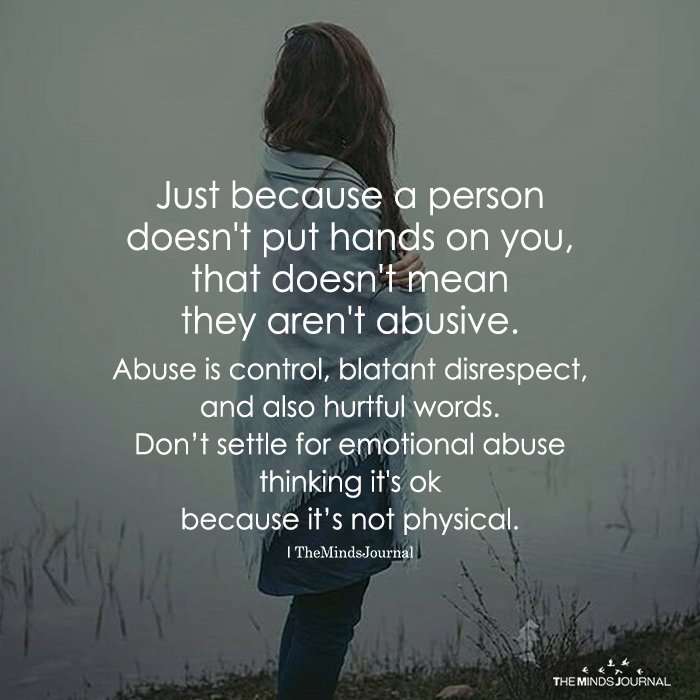
Can You Stop Being Abusive?
Although abusers get a lot of hate, especially from those who have been abused, and rightly so, it is possible for an abusive person to change their attitude and behavior. You can be a better person. You can treat your partner and others with respect yet be assertive. You can be compassionate and loving and be loved in return as well. It is never too late to stop abuse and rebuild your relationship.
“The fact you want to change is a good indicator that you could sort this out. However, doing it alone may be difficult. Having friends/family to support you… are all good things to try,” writes Dr. Petra-boynton in an article published in The Telegraph.
If you have been an abusive person till now, then changing your perspective, attitude and behavior can be a challenging and long process. You will often resort to your old beliefs to justify abuse and engage in toxic behavior again. However, when you have the support of your friends and family, you can learn how to bring positive change and how to respect your partner. Change is possible. But it has to come from inside before you can actually implement it in your relationship and your life.
Related: 4 Abusive Behaviors That Are Not Physical But Equally Damaging
How To Stop Being An Abusive Person
Most of the time, abusive people make false promises about changing themselves just to prevent their partners from leaving them. But sometimes, an abusive person may genuinely regret their actions and want to change and stop hurting their loved ones. So if you are ready to change and put an end to abuse for good, then here are a few steps that can help you bring about some serious change.
1. Admit that you’re an abusive person
This is the hardest, yet most important part. Abuse is not just about physical violence. Emotional and verbal abuse is perhaps the most prevalent type of abuse in relationships. Emotional abuse breaks trust and connection and leads to resentment and hatred. However, when you’re trapped in the cycle of abuse, it can often be hard to realize that. This is why you need to pause and take a good look at yourself.
If you believe that your behavior or actions were wrong, then you need to accept that you are an abusive person. Admit that YOU are the problem in your relationship and not your partner. The moment you recognize, accept, and acknowledge that your behavior is the real issue, you will find the reason to change.
2. Decide to change
How desperately do you want to stop being abusive? Is this something you want to try to keep your partner from leaving or is it something you want to truly accomplish? Change is never easy. The process of changing your abusive mindset, your personality, and tendencies is going to be a difficult process, to say the least. Things will get hard as you take each step and sooner or later you will want to quit. You will realize that being your old abusive self is a lot easier, even if it comes at the cost of hurting your loved ones.
However, if you want to overcome your abusive instincts and be a new person, then you need to make a decision about it and reach the end, no matter what. You have to commit to change. You have to motivate yourself on a daily basis and put in the hard work. But most importantly, you have to do this for yourself, not for anyone else. “He must change for his own sake – not to keep his wife or girlfriend tied to him,” writes Lisa Aronson Fontes, Ph.D., author, and Senior Lecturer at University of Massachusetts Amherst.
Related: Women Abuse Men Too
3. Take responsibility for your actions
You have to realize that you have complete control over your thoughts, behaviors, and actions. You are in control of what you say and how you act with your partner and others. You have to admit that it is never their fault, but your own. No one deserves to be abused. So you need to take responsibility for your abusive behavior and refuse to be a controlling, abusive person.
Although there may be tons of reasons that may influence your behavior, only you are responsible for your actions. When you recognize that you are responsible for physical, emotional, and psychological abuse towards your partner and others, you can finally find the strength to apologize for your behavior.
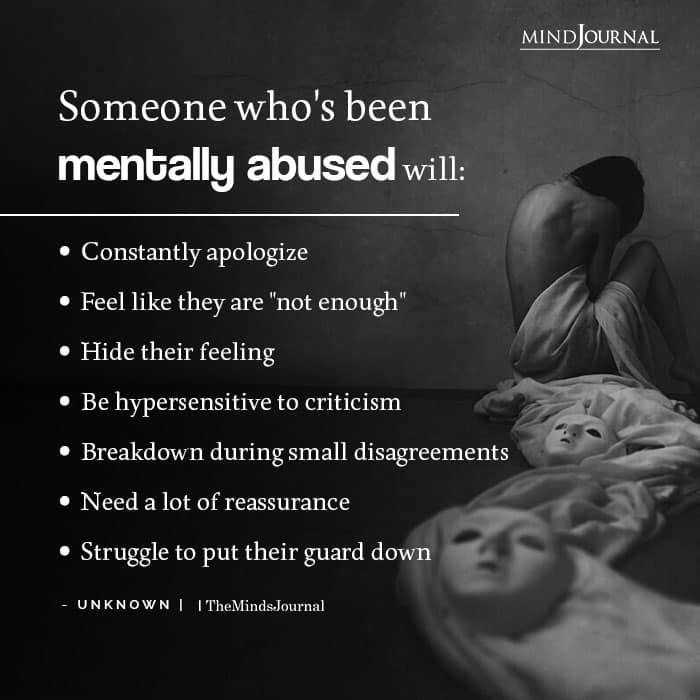
4. Talk to the survivor
Speak with the person you have abused till now. Sit down with them, apologize from your heart, and simply listen to them. Truly listen to what they have to say. Understand how you’ve made them feel, how your behavior affected them and how your actions broke them. Yes, this will be a difficult process. But this will also encourage and inspire you to change. It will help you see how you have hurt the ones you love and why you need to change.
Listen to them without judgment. Without being defensive. Without blaming them or yourself. Listen to understand, not to explain. Listen to the person you have abused without feeling attacked.
This is a crucial step in breaking the cycle of abuse. This will help you gain the perspective you need to stop being an abusive person and become who you truly need to be – a loving, compassionate, caring, and supportive person.
Related: 10 Things That Happen Only In An Emotionally Abusive Relationship
5. Don’t accept your excuses
Once you listen to the survivor, it is likely that you may try to explain or justify your behavior as an abusive person. You may find various reasons that might have led to your abusive behavior in the past. But don’t believe in them. Do not believe your own excuses for your abusive behavior. People do not abuse others because they are bad, sadistic people who enjoy others’ pain. They become abusive because of their own suffering.
It is all the pain and suffering you’re holding inside that makes you an abusive person. It makes you feel insecure and vulnerable. With your feeble self-esteem and poor sense of self-worth, you struggle every day to overcome that pain. However, instead of lifting yourself, your suffering forces you to bring others down.
But you need to overcome this tendency. You need to stop using your suffering as an excuse for abusing others, especially your loved ones. It is only by healing yourself from your inner pain, you can truly transform yourself into a better person.
6. Forgive yourself
Yes, you are an abusive person. But that doesn’t have to define you for the rest of your life. Abuse is something we do, it is not who we are. So forgive yourself for hurting the people you love. It is only by forgiving yourself you can stop the cycle of abuse and transform yourself.
An abuser often hurts others because of all the pain they feel inside. As they start to blame society and others for their suffering, they avoid accountability. Moreover, to ease the pain they hold inside, they start to hurt others.
But once you accept the truth about abuse and take responsibility for your behavior, you can stop hurting others. And you can start forgiving yourself. Forgiveness is a powerful tool when it comes to healing yourself. We all have goodness within us. All of us are capable of change.
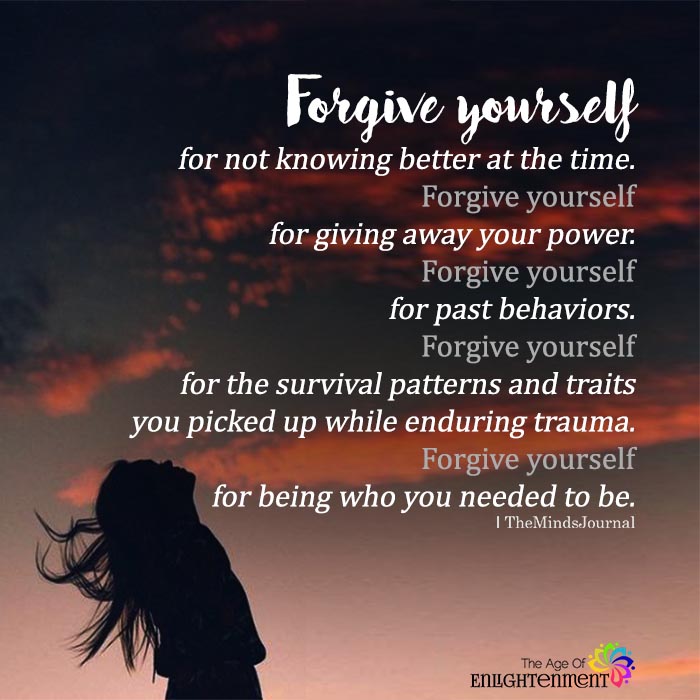
7. Lower your expectations
Expectations, or unrealistic expectations to be precise, are often the root cause for most problems in relationships. When unrealistic expectations are left unmet, it leads to resentment and hatred, which gives rise to blame and accusations. This, in turn, leads to abuse.
When you start lowering your expectations from your partner and your loved ones, you liberate yourself and them from following certain unnecessary patterns. This will help you to overcome your controlling behavior and enable you to choose how you want to react to every situation. When you stop expecting from others, you stop blaming them. When you stop blaming them for not meeting your expectations, you stop abusing them.
Moreover, you should also keep in mind that you should not expect the people you have abused to forgive you. Although you are determined to stop being an abusive person, they have still experienced abuse from you. It has affected them emotionally and psychologically and may have even led to trauma. Simply be accountable, focus on changing yourself and forgive yourself without expecting others to forgive you.
8. Learn to respect your partner
If you are abusive towards your partner or even other people, then you need to accept that they are independent human beings and respect their opinions and actions. Understand that your partner has a separate identity. They have their own thoughts, beliefs, perceptions, needs, habits, and dreams. They are not YOU. Their life should not revolve around you.
They have the right to live their lives the way they want to. They have the right to have a private and personal life that is separate from you. They have the right to choose their career and friends. You don’t have the right to control them or tell them what they should or shouldn’t do. They do not deserve to be abused or punished by you.
Respect them for they are and accept them in all their imperfect glory. You need to accept their decisions and opinions without imposing your decisions on them. You need to accept that they have the right to leave and end the relationship. Respect is the opposite of abuse.
Related: 25 Ways You Can Show Respect to Your Partner
9. Reinvent love
Relationships are complicated. It can be even more chaotic when you are an insecure person who believes they don’t deserve to be loved. By holding on to the pain and suffering inside, you make yourself believe that your partner will leave you unless you isolate and control them. Your insecurities give rise to a persistent fear of the end of the relationship.
But here’s the thing – relationships end. Some of them do last a lifetime, but most of them don’t. You need to enjoy the relationship for as long as it lasts instead of desperately keeping it from reaching a natural conclusion.
It’s okay for a relationship to end because the end will mark a new beginning. The more you become desperate to hold on to your relationship and your partner, the more jealous, controlling, and abusive you will become. And no one wants to stay with an abusive person. So learn to let go and redefine love and relationships.
10. Seek help
If you think that you are abusive then you need to seek professional help and support from your loved ones. Most of the time, abuse can often arise from certain underlying mental health conditions like trauma, anxiety, depression, and substance abuse. Treatment can not only help you to cope with the symptoms of mental disorders, but it can also empower you to bring about a necessary change in your mindset, attitude, and personality.
Consulting a licensed therapist, counselor, clinical social worker or mental health professional will enable you to manage your thoughts and emotions and gain better control over your reactions. Therapy can help you with substance abuse issues, anger management issues, unhealthy boundaries and toxic relationship tendencies. Moreover, learning and implementing certain self-help strategies and quitting alcohol or drugs can also help you stop being abusive.
Related: 10 Common Myths About Therapy
Be Compassionate, Not Abusive
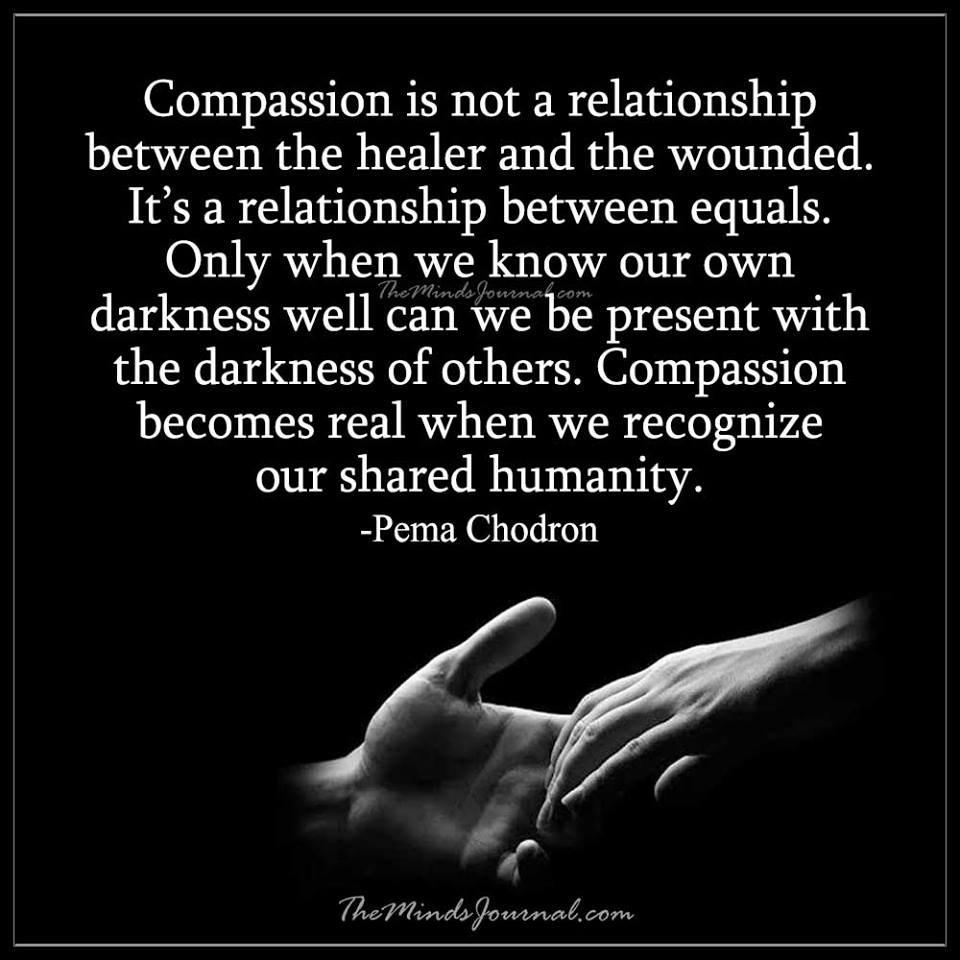
Admitting that you are an abusive person and deciding to change takes a lot of strength and courage. But change is possible. Although most abusers never change, some do. And you can too. You can become a loving, compassionate, caring, supportive, and “non-abusive” person. You can build happier, healthier relationships.
As long as you are committed and determined, you have a strong support system and you seek professional help, you can change your abusive personality. All you need to do is be accountable, forgive yourself, respect others and control your expectations.
Here is an interesting video that you may find helpful:
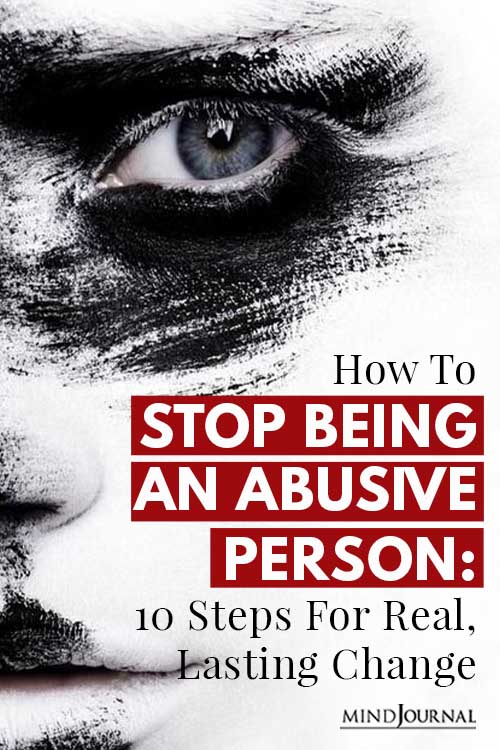



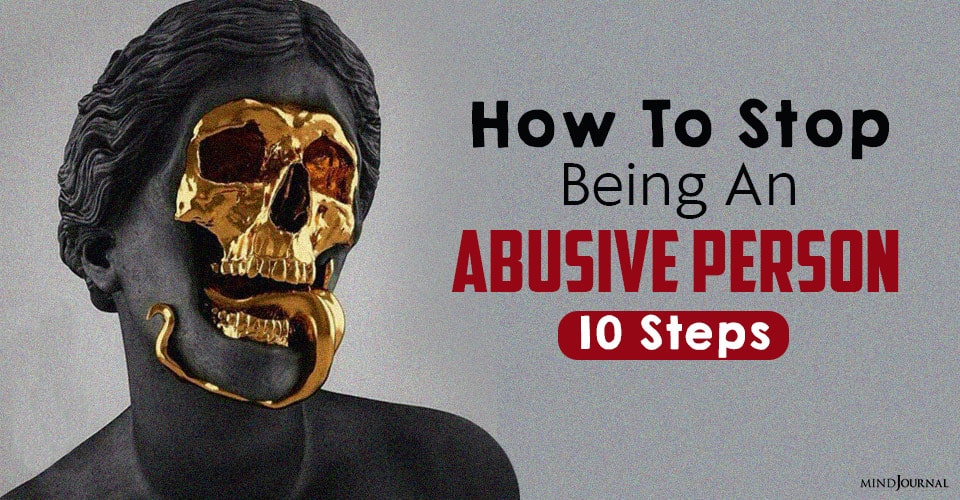







Leave a Reply